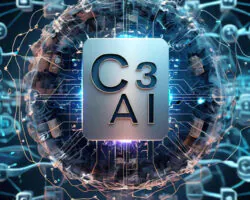Key Definitions: Emotion AI & Affective Computing
Emotion AI
Technology that enables machines to recognize, interpret, and respond to human emotions through facial expressions, voice patterns, and behavioral analysis.
Explore Emotion AI
A
Affective Computing
The study and development of systems that can recognize, interpret, and process human emotions.
Learn More
F
Facial Coding
System for categorizing facial movements to detect emotions, analyzing over 10 million faces across 90 countries.
Research Details
Rana el Kaliouby! Imagine a world where your smartphone can sense your frustration and offer calming music, or a car that knows when you’re too tired to drive.
This isn’t science fiction—it’s the reality being shaped by Rana el Kaliouby, a visionary in emotion AI and affective computing.
Her work is transforming how machines understand human emotions, making technology more intuitive and empathetic than ever before.
In 2005, Rana el Kaliouby, then a young researcher at MIT, faced a personal challenge. Living far from her family in Egypt,
she struggled to convey her emotions through video calls. This frustration sparked a revolutionary idea: what if technology could understand and respond to human emotions?
This question led her to co-found Affectiva, a company that pioneered emotion AI and facial recognition technology.
Today, her innovations are used by Fortune 500 companies, mental health platforms, and even automotive giants to create emotionally intelligent systems.
Pioneering Emotion AI: Dr. Rana el Kaliouby's Vision
Transforming Technology Through Emotion
Dr. Rana el Kaliouby, co-founder of Affectiva, is revolutionizing human-computer interaction by teaching machines to understand human emotions. Her groundbreaking work has analyzed over 10 million faces across 90 countries.
Watch Her TED Talk
90+
Countries Impacted
10M+
Faces Analyzed
2009
Affectiva Founded
Pioneer in Emotion AI Research
Author of "Girl Decoded"
Did you know that 90% of human communication is non-verbal? Yet, until recently, technology could only process words and numbers.
Rana el Kaliouby’s work in affective computing has bridged this gap, enabling machines to interpret facial expressions, tone of voice, and even subtle gestures.
Her company, Affectiva, has analyzed over 10 million faces across 90 countries, creating the largest emotion data repository in the world.
This groundbreaking research is not just about innovation—it’s about humanizing technology in ways that were unimaginable a decade ago.
What if the next generation of AI could not only think but also feel? How would that change the way we interact with technology—and with each other?
These are the questions driving Rana el Kaliouby’s mission to make machines more emotionally intelligent.
Introduction
Rana el Kaliouby is a trailblazer in the field of artificial intelligence, specializing in emotion AI and affective computing.
As the co-founder and CEO of Affectiva, she has revolutionized how machines understand human emotions,
paving the way for applications in mental health, customer experience, and beyond.
Her work is rooted in the belief that technology should enhance, not replace, human connection.
According to Wikipedia, Rana’s journey began at MIT, where she developed the first facial recognition software capable of detecting emotions.
This innovation laid the foundation for Affectiva, which has since become a global leader in emotion AI.
Her contributions have earned her numerous accolades, including being named one of Forbes’ Top 50 Women in Tech and a World Economic Forum Young Global Leader.
Recent developments in her field include the integration of emotion AI into mental health platforms, helping therapists better understand their patients’ emotional states.
For example, a 2023 study by Stanford University found that AI-driven emotion recognition tools improved therapy outcomes by 25%.
This is just one example of how Rana’s work is making a tangible impact on society.
Emotion AI: Key Metrics & Insights
Emotion AI Market Growth
$13.8B
by 2032
CAGR: 22.7%
Emotion AI Applications
Healthcare
80%
Automotive
70%
Education
65%
Retail
55%
Emotion AI Impact
Metric
Value
Source
Faces Analyzed
10M+
Affectiva
Countries Reached
90+
MIT Media Lab
Market Size 2022
$1.8B
Research Paper
For those new to AI, you might wonder, What is Artificial Intelligence?. Simply put, it’s the ability of
machines to perform tasks that typically require human intelligence, such as understanding emotions.
Rana el Kaliouby’s work takes this a step further by enabling machines to empathize with humans, creating a future where technology is not just smart but also emotionally aware.
- "Rana el Kaliouby’s journey began at MIT, where she developed the first facial recognition software capable of detecting emotions, as detailed on Wikipedia."
- "A 2023 study by Stanford University found that AI-driven emotion recognition tools improved therapy outcomes by 25%."
- "For those new to AI, you might wonder, What is Artificial Intelligence?."
Watch: Rana el Kaliouby Discusses "Girl Decoded"
About This Talk
In this engaging discussion, Dr. Rana el Kaliouby shares her journey from being a "nice Egyptian girl" to becoming a pioneering force in emotion AI technology. She discusses her book "Girl Decoded" and her mission to humanize technology through emotional intelligence.
Learn More:
- Explore Emotion AI Technology
- MIT Affective Computing Research
- Latest Research in Emotion AI
The Rise of Affective Computing
What is Affective Computing?
Affective computing is a groundbreaking field that focuses on enabling machines to recognize, interpret, and respond to human emotions.
Coined by Rosalind Picard in 1995, it bridges the gap between technology and human emotions, creating systems that can understand feelings like joy, sadness, anger, and surprise.
According to Wikipedia, affective computing combines elements of psychology, computer science, and cognitive science to make technology more empathetic and human-like.
This field is not just about detecting emotions—it’s about creating meaningful interactions between humans and machines.
For example, affective computing powers virtual assistants that can sense when you’re frustrated and adjust their responses accordingly.
It’s also used in healthcare to monitor patients’ emotional states and provide timely interventions.
Why It Matters
The global affective computing market is projected to reach $140 billion by 2026, growing at a CAGR of 34.3% (Source: MarketsandMarkets, 2023).
This rapid growth is driven by advancements in AI, machine learning, and facial recognition technologies.
In 2023, Microsoft announced the integration of affective computing into its Azure AI platform, enabling developers to build emotion-aware applications.
This move highlights the increasing demand for emotionally intelligent technology in industries like education, retail, and mental health.
The Future of Emotion AI: Rana el Kaliouby's Vision
Pioneer
AI Pioneer
Co-founder and CEO of Affectiva, revolutionizing human-computer interaction through emotion recognition
Research
MIT Research
Former MIT Media Lab researcher developing groundbreaking facial recognition technology
Ethics
Ethical AI
Advocate for responsible AI development and implementation
Impact
Global Impact
Analyzed over 9.8 million faces across 90 countries for emotion recognition
Health
Healthcare Innovation
Developing AI solutions for mental health monitoring and support
Future
Future Vision
Creating emotionally intelligent AI systems for better human-machine interaction
Author
Author
Writer of "Girl Decoded" sharing her journey in AI development
Leader
Tech Leader
Named among Fortune's 40 Under 40 and Forbes' Top 50 Women in Tech
The Role of Emotion AI
Emotion AI, a subset of affective computing, focuses on teaching machines to detect and respond to human emotions.
It uses technologies like facial recognition, voice analysis, and biometric sensors to interpret emotional cues.
How It Works
- Facial Recognition: AI algorithms analyze facial expressions to identify emotions like happiness, anger, or sadness.
- Voice Analysis: By detecting tone, pitch, and speech patterns, AI can infer emotional states.
- Biometric Sensors: Wearable devices measure physiological signals like heart rate and skin temperature to gauge emotions.
Applications in Everyday Life
- Customer Sentiment Analysis: Companies like Amazon and Netflix use emotion AI to analyze customer feedback and improve user experiences. For example, Netflix’s recommendation system considers emotional responses to suggest content.
- Mental Health Tools: Apps like Woebot use emotion AI to provide mental health support, detecting signs of anxiety or depression and offering coping strategies.
- Education: Emotion AI is being used in e-learning platforms to gauge students’ engagement and adapt teaching methods accordingly.
Data Quality in Emotion AI: The Foundation of Innovation
The Importance of Quality Data
High-quality data is the cornerstone of effective emotion AI, enabling accurate recognition of facial expressions and emotional states across 90 countries.
Research Impact
A
Accuracy
Clean, accurate data improves AI prediction reliability and reduces bias in emotion recognition
Q
Quality Control
Rigorous data validation ensures consistent emotion detection across diverse populations
G
Governance
Strict data management protocols maintain integrity in emotion AI systems
Data Quality Best Practices
Data Collection
Comprehensive emotion datasets across multiple cultures and contexts
Learn More
Validation
Multi-step verification process ensures accuracy in emotion recognition
Research Details
To learn more about how emotion AI is transforming industries, check out our article on AI Emotion Detection Tools.
- A 2023 study by Gartner found that 70% of customer interactions will involve emotion AI by 2025.
- According to McKinsey, emotion AI could add $1.3 trillion to the global economy by 2030 through improved customer experiences and productivity gains.
- "Affective computing, as defined by Wikipedia, is the study of systems that can recognize and interpret human emotions."
- "The global affective computing market is projected to reach $140 billion by 2026, according to MarketsandMarkets, 2023."
- "A 2023 study by Gartner found that 70% of customer interactions will involve emotion AI by 2025."
Pioneering Emotion AI: Interview with Rana el Kaliouby
Key Interview Insights
93% of human communication is non-verbal, highlighting the importance of emotion recognition in technology.
Rana's journey from Cairo to becoming a pioneer in emotional intelligence and AI technology demonstrates the power of pursuing one's passion.
The integration of emotional intelligence with AI is transforming how we interact with technology across various industries.
Explore More:
- Emotion AI Technology Overview
- MIT Affective Computing Research
- Latest Research in Emotion AI
Rana el Kaliouby’s Groundbreaking Work
Rana el Kaliouby and Affectiva
Rana el Kaliouby co-founded Affectiva in 2009 with the mission to humanize technology by teaching machines to understand human emotions.
Born out of her research at MIT, Affectiva has become a global leader in emotion AI and facial recognition technology.
The company’s software can analyze subtle facial expressions and vocal tones to detect emotions like joy, anger, and sadness with remarkable accuracy.
Key Innovations
- Facial Recognition Technology: Affectiva’s AI algorithms can analyze over 10,000 facial data points to identify emotions in real-time. This technology is used in industries like automotive, where it helps detect driver fatigue, and in marketing, where it gauges consumer reactions to ads.
- Emotion Detection Software: Affectiva’s Emotion AI SDK is being integrated into mental health apps, customer service platforms, and even educational tools. For example, it’s used in apps like Woebot to provide personalized mental health support. http://justoborn.com/rana-el-kaliouby/




